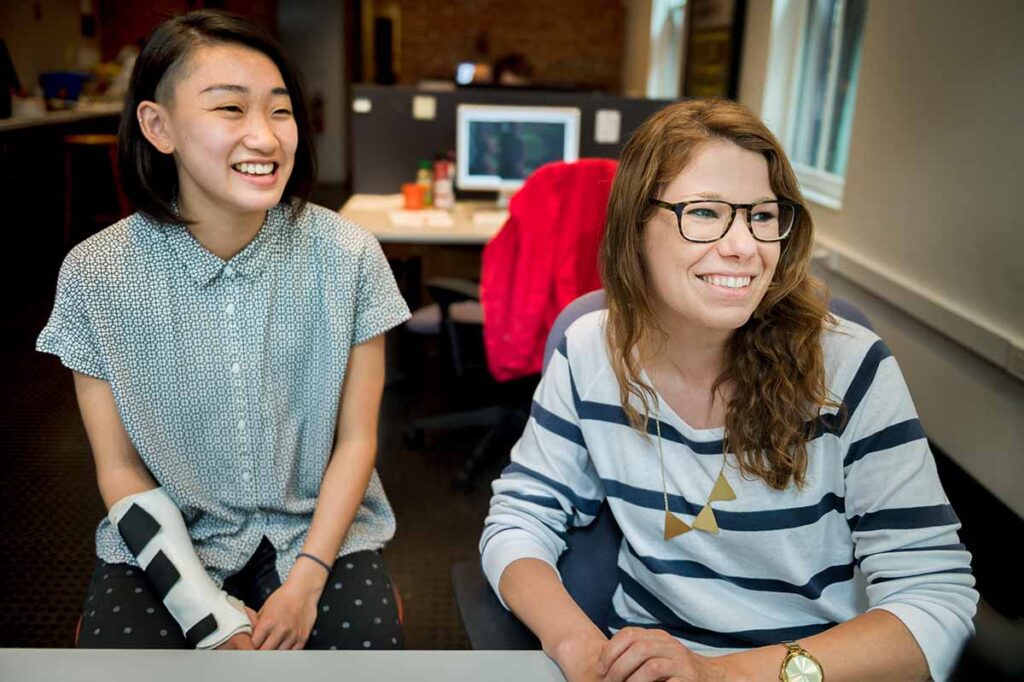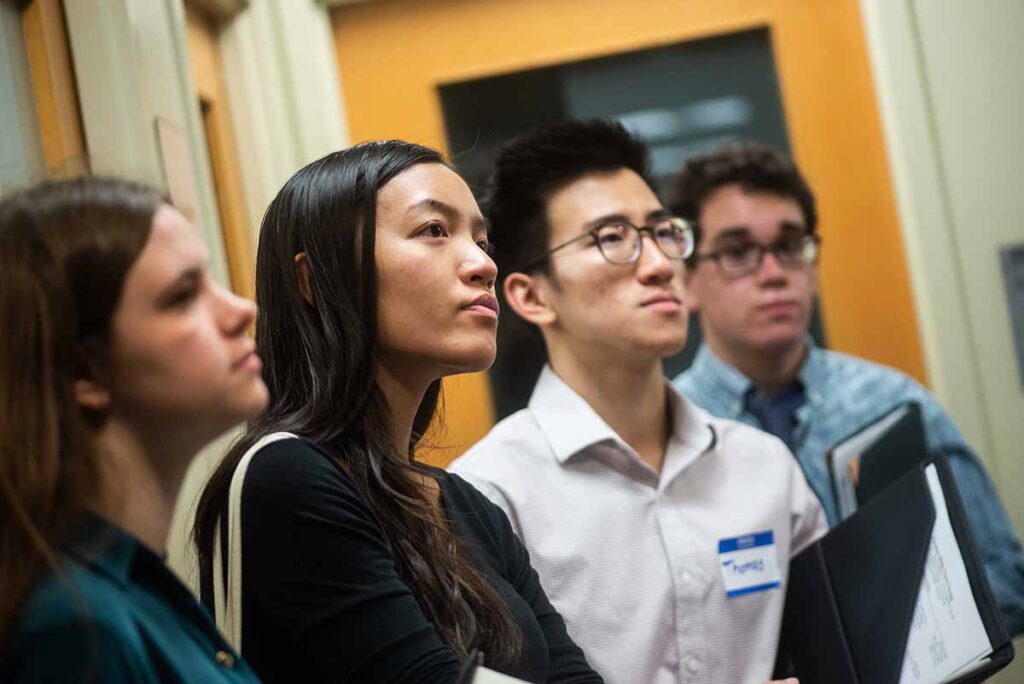
Undergraduate Co-op Process
We’re here every step of the way
Khoury College is here to provide all the resources, insights, and support you need to have successful undergraduate co-op experiences. Your co-op coordinator, who will be assigned to you at the beginning of your first co-op search, is an essential resource in navigating the co-op process and providing career education throughout the entirety of your experiences.
Most students will complete two co-op experiences over their time at Khoury College. Your co-op schedule is determined by your Pattern of Attendance (POA), a semester-by-semester schedule that determines when you’ll be in class or on co-op. Your pattern is assigned before the start of your first year.
This page contains the following information:
Co-op eligibility and preparation process
You will be prompted to complete the “Intent to Co-op” process prior to the start of each co-op search. All first co-op searches begin in your second year of study. The co-op cycle is typically from July to December or January to June depending on your POA, although there is flexibility to complete four-month or even eight-month co-ops depending on your academic plans. Summer experiences are also permitted; you’ll work with both your academic advisor and co-op coordinator to determine the best plan for you.
Sample co-op patterns:
MB pattern | 4 year, 2 co-op (July to December)
| Year | Fall | Spring | Summer 1 | Summer 2 |
|---|---|---|---|---|
| 1 | School | School | School | School |
| 2 | School | School | School | Co-op |
| 3 | Co-op | School | School | Co-op |
| 4 | Co-op | School |
MA pattern | 4 year, 2 co-op (January to June)
| Year | Fall | Spring | Summer 1 | Summer 2 |
|---|---|---|---|---|
| 1 | School | School | School | School |
| 2 | School | Co-op | Co-op | School |
| 3 | School | Co-op | Co-op | School |
| 4 | School | School |
Ensure you’re eligible to go out on co-op by visiting the “Co-op eligibility requirements” section on the Khoury College co-op policies webpage. In addition to meeting the co-op eligibility requirements for both Khoury College and the university, you must adhere to all policies outlined on that site. This includes but is not limited to academic probation, professional standards, etc.
Support on your co-op search
- You’ll gain exposure to career paths, opportunities to engage in experiential learning opportunities, and help with building your resume and online professional presence in the first year at Khoury College through CS1200 and other workshops dedicated to first-year students.
- During the second year, you’ll complete CS1210 (Professional Development for Co-op), which will focus on tangible skills leading to a successful job search, such as interviewing and professional networking. You’ll also work closely with your co-op coordinator during this timeframe through 1:1 meetings and ongoing communication.
- Your coordinator will work with you to determine the types of jobs that match your background, skills, and career goals, as well as to improve your job search skills. Hiring decisions are made by employers.
- It’s to your benefit to dedicate substantial effort to your job search and work with your coordinator in a professional and collaborative manner.
- You’ll gain access to NUworks (Northeastern’s internal career management portal) and be given guidance on additional external resources such as HandShake, Career Shift, and others, so you can begin identifying and applying for jobs.
- All jobs listed in NUworks have been developed and assessed to ensure they meet the expectations of Northeastern’s co-op program.
- Note that jobs found outside the NUworks database must be approved by your co-op coordinator. Your co-op coordinator will schedule a call to go over Northeastern’s co-op expectations and answer any questions the employer may have prior to approving the role as a co-op experience.
Types of co-op jobs
Co-op jobs depend on industry demand and vary from semester to semester. Khoury College’s diverse combined major options allow students to target a range of different industries and positions, including but not limited to software development, network administration, data analytics, cybersecurity, and game development.

Hours and salary expectations
Employers make salary decisions based on the type of position, location, student skill sets, and industry. While Khoury co-op coordinators provide suggested salary guidelines to employers, these are averages and some industries may be lower.
Khoury College approves positions that are 32 to 40 hours per week. You should expect to work full time throughout your co-op. Part-time positions are also an option, although you’ll be expected to enroll in two academic courses to main full-time student status.
Job locations
There are many jobs located in Greater Boston; however, jobs are also posted in locations such as California, New York, Washington, DC, and globally. Work with your co-op coordinator to explore resources outside the co-op database to widen your job search into different industries and regions.
On-the-job support and responsibilities
While on co-op, you’ll be enrolled in a Co-op Work Experience course where you’ll get guidance on professionalism, on-the-job communication skills, and other resources useful to your work experience.
Each co-op position is unique, and it comes with a set of responsibilities to be determined and agreed upon by you, the employer, and your co-op coordinator prior to accepting the position. However, all Khoury College co-op participants are expected to adhere to the following responsibilities:
- Start work on the date indicated in your offer letter and work until the end date established with your hiring manager. Exceptions must be approved by your co-op coordinator. (Failure to do so may result in a “U” grade and ineligibility for future co-ops.)
- Abide by the terms of the Professional Standard Agreement form.
- Notify your co-op coordinator of any issues or concerns during your co-op experience.
- Identify and complete established learning outcomes with your manager and reflection as instructed by your co-op coordinator.
Doing the work is a big part of co-op, but so is the process of growing your awareness of yourself as a student, an employee, and an individual. These culminate in a self-assessment and a performance appraisal completed by your job supervisor.

International student co-op eligibility
International students who wish to participate in a co-op or an internship must receive authorization from their co-op coordinator and the Office of Global Services (OGS) before taking part in any work experiences.
Please review the Curricular Practical Training (CPT) requirements on the OGS website. Students on F-1, J-1, and other visas that allow CPT are permitted to go on co-op under the approval of OGS and your co-op coordinator. Upon accepting a job, you must complete the CPT Authorization Request Form and follow the instructions for work authorization.
You should work closely with your co-op coordinator and the OGS during this process to ensure visa compliance. Students who fail to complete the required steps for work authorization under the guidance of their co-op coordinator and OGS are at risk of violating their visa status.
While many employers hire international students or permanent residents, some (such as government contractors requiring U.S. security clearance) are unable to do so. You may choose to consider a “home country co-op” and return to your country of origin during the six-month work period. This experience would not require or affect your CPT authorization.
Self-directed co-ops
A self-directed co-op is one in which the student takes part in a self-driven project or endeavor with a (or multiple) faculty mentor(s) at Northeastern. Self-directed co-ops are often more independent and allow for more flexibility than a traditional co-op at an employer. Students can choose to complete a self-directed co-op to meet the university’s experiential learning requirement and should inform their co-op coordinator early in their search term to submit their written proposal for approval.